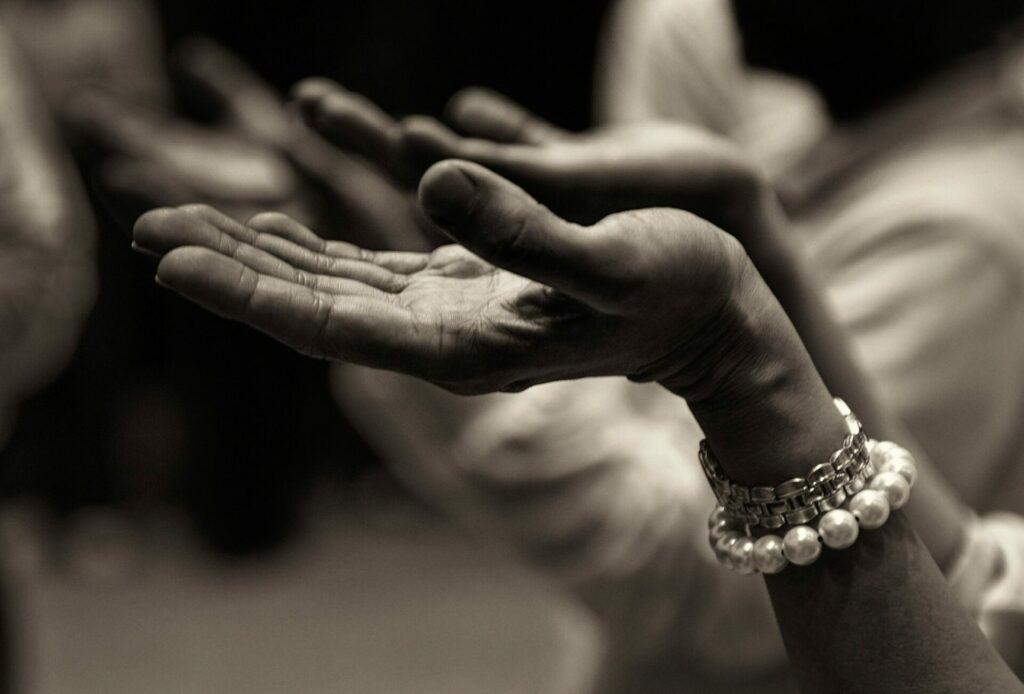Faith’s Role: Easing Anxiety About Death & Finding Solace
The inevitability of death often stirs fear and anxiety within us. However, faith, in its many forms, can be a beacon of hope, providing solace and easing these anxieties. This article delves into the role of faith and coping with death, the intersection of spiritual beliefs and anxiety, and the benefits of incorporating faith into the journey of healthy aging.
Faith has been a guiding force for individuals throughout history, offering a sense of purpose, comfort, and hope. It can provide a framework for understanding the larger questions of life and death, helping us find meaning in our existence. When facing the prospect of mortality, faith can offer a sense of assurance and belief in something greater than ourselves.
For many, faith takes various forms, whether through organized religion, personal spirituality, or philosophical beliefs. Regardless of the specific path one follows, incorporating faith into the aging process can bring about a range of benefits that positively impact overall well-being.
Firstly, faith provides a sense of belonging and community. Engaging with a religious or spiritual community allows individuals to connect with like-minded individuals who share similar values and beliefs. This sense of belonging can reduce feelings of isolation and foster a support network, particularly important as we age and face the inevitable challenges that come with it.
Moreover, faith can serve as a source of strength during difficult times. When confronted with the prospect of our mortality, faith offers a comforting presence, reminding us that we are not alone in our struggles. It can provide solace and guidance, helping us navigate the emotional turmoil that may arise when contemplating the end of life.
Additionally, faith instills a sense of hope and purpose. By embracing spiritual beliefs, individuals often find renewed motivation and a higher sense of meaning in their lives. This newfound purpose can drive individuals to make healthier choices, engage in self-care practices, and prioritize their well-being. Faith empowers individuals to focus on their physical, emotional, and spiritual health, contributing to a higher quality of life and promoting healthy aging.
Incorporating faith into the journey of healthy aging is a deeply personal and individual experience. It’s not about adhering to a specific set of beliefs, but rather finding what resonates with you and brings comfort and solace. Whether it’s attending religious services, engaging in meditation and prayer, or embracing nature as a spiritual connection, faith can be a powerful tool in easing anxiety about death and embracing the journey of healthy aging.
How Does Faith Help with Grief?
Grief is a deeply personal and challenging journey that accompanies the loss of a loved one or significant life changes. Faith plays a crucial role in helping individuals navigate the complex emotions and find solace in times of grief. By providing comfort, support, and a sense of meaning, faith can help individuals cope with their grief and begin the healing process.
Faith offers a source of hope and reassurance, reminding individuals that their loved ones may continue to exist in a spiritual realm or that there is a greater purpose to their loss. Many religious and spiritual traditions provide rituals, prayers, and community support that guide individuals through the grieving process. These practices allow individuals to express their emotions, find support from others who share their faith, and seek comfort in their spiritual beliefs.
Moreover, faith provides a framework for understanding the concept of death and the afterlife. Believing in an afterlife or the continuation of the soul can bring comfort and reassurance to those experiencing grief. It offers the belief that their loved ones have transitioned to a better place or are still present in some form, providing a sense of connection and peace.
Faith also offers teachings and wisdom that address the spiritual and existential aspects of grief. It encourages individuals to contemplate the nature of life, the impermanence of existence, and the transformative power of loss. Through these teachings, faith can guide individuals towards finding meaning and purpose in their grief, ultimately leading to healing and growth.
In times of grief, faith provides a supportive community that understands the depth of emotions and offers empathy and compassion. Religious and spiritual communities often come together to provide practical assistance, emotional support, and companionship during times of loss. This sense of belonging and connection can provide tremendous comfort and alleviate feelings of isolation.
By embracing faith, individuals can find solace, strength, and a sense of hope in the midst of their grief. It offers a way to honor the memory of their loved ones, navigate the complex emotions of loss, and eventually find healing and a renewed sense of purpose.

The Psychological and Emotional Benefits of Faith in Healthy Aging
When it comes to healthy aging, nurturing our psychological and emotional well-being is just as important as taking care of our physical health. Faith can be a powerful ally in this regard, offering a range of benefits that contribute to a more fulfilling and vibrant life.
One of the key psychological benefits of faith is its ability to provide a sense of inner peace and tranquility. When we face the uncertainties and challenges that come with aging, faith can serve as an anchor, grounding us in a belief system that offers comfort and reassurance. It provides a framework through which we can make sense of the world and find solace in difficult times.
Moreover, faith can help alleviate anxiety and fear surrounding death. The existential questions that arise as we approach the later stages of life can be daunting. However, by embracing faith, we can find a sense of acceptance and trust in the natural cycle of life and death. This acceptance allows us to shift our focus towards living fully in the present moment and making the most of the time we have.
Faith also plays a significant role in promoting emotional well-being. It offers a space for reflection, self-exploration, and emotional release. Many religious and spiritual practices emphasize the importance of forgiveness, gratitude, and compassion, which can contribute to emotional healing and resilience. By engaging in rituals and practices associated with our faith, we can cultivate a greater sense of emotional balance and contentment.
Additionally, faith provides a source of hope and optimism. Believing in something greater than ourselves and embracing a higher purpose can inspire us to approach life’s challenges with resilience and determination. This optimistic outlook has been linked to better overall health outcomes, including lower rates of depression, improved stress management, and a higher quality of life.
Incorporating faith into our lives doesn’t mean that we ignore or dismiss the difficulties that come with aging. Instead, it offers us the tools to navigate those challenges with grace and resilience. By tapping into our spiritual beliefs, we can draw strength from a source beyond ourselves, enabling us to confront adversity and find meaning in our experiences.
How Does Faith Help with Anxiety?
Anxiety can be a challenging and overwhelming emotion that affects various aspects of life. Faith can play a significant role in helping individuals manage anxiety and find a sense of peace and security. By providing a source of strength, guidance, and perspective, faith offers powerful tools for navigating the complexities of anxiety.
One way faith helps with anxiety is by fostering a sense of trust and surrender. Many religious and spiritual traditions emphasize the concept of surrendering one’s worries and concerns to a higher power. By relinquishing control and placing trust in a divine presence, individuals can experience a sense of relief and peace. This trust allows them to release their anxieties and find comfort in the belief that there is a greater plan or purpose guiding their lives.
Prayer and meditation are integral practices within many faith traditions that can help alleviate anxiety. Engaging in prayer allows individuals to express their concerns, seek guidance, and find solace in the act of connecting with a higher power. Meditation, on the other hand, cultivates mindfulness and inner awareness, enabling individuals to observe and detach from anxious thoughts and emotions. These practices promote a state of calmness, centeredness, and spiritual connection, which can counteract anxiety.
Faith also provides individuals with a sense of meaning and purpose, which can alleviate anxiety by shifting the focus from personal worries to a broader perspective. By embracing spiritual beliefs, individuals often find a higher purpose beyond their immediate concerns. This sense of purpose brings a greater sense of fulfillment and directs attention away from anxious thoughts, allowing individuals to engage in meaningful actions that contribute to their own well-being and the well-being of others.
Community support is another valuable aspect of faith in managing anxiety. Religious and spiritual communities often provide a supportive network of individuals who share similar beliefs and values. Through participation in group activities, discussions, and support groups, individuals can find comfort, understanding, and encouragement. This sense of belonging and connection can be a powerful antidote to feelings of isolation and anxiety.
Overall, faith provides individuals with tools, practices, and perspectives that help manage anxiety. Whether through prayer, meditation, finding meaning and purpose, or seeking support from a community, faith offers a comprehensive approach to addressing anxiety. By embracing and incorporating faith into their lives, individuals can experience a greater sense of peace, resilience, and well-being in the face of anxiety’s challenges.

Does Spirituality Help with Death?
Death is an inevitable part of the human experience, and spirituality can provide significant support and comfort during this challenging time. Spirituality offers a framework for understanding and grappling with the concept of death, providing solace, hope, and a sense of transcendence.
One way spirituality helps with death is by offering beliefs and perspectives on the continuity of life beyond the physical realm. Many spiritual traditions emphasize the existence of the soul or the notion of an afterlife. These beliefs provide individuals with the reassurance that death is not the end but rather a transition to another state of being. This understanding can bring comfort, as it suggests that the essence of a person continues to exist beyond death, fostering a sense of connection and continuity.
Spirituality also provides rituals, ceremonies, and practices that help individuals navigate the process of death and grieving. These practices offer a framework for honoring and commemorating the lives of those who have passed away. They provide rituals for mourning, healing, and finding closure, allowing individuals to express their grief and find comfort in shared traditions and community support.
Moreover, spirituality helps individuals confront their own mortality by encouraging contemplation and reflection on the nature of life and death. Spiritual practices such as meditation, prayer, or mindfulness enable individuals to cultivate a deeper understanding of their own impermanence and the transient nature of existence. This awareness can lead to a greater appreciation for the present moment and a renewed focus on living a meaningful life.
Spirituality also offers a source of strength and support during the grieving process. By turning to spiritual beliefs and practices, individuals can find solace, guidance, and a sense of connectedness to something greater than themselves. This connection can provide comfort, perspective, and emotional healing as individuals navigate the complexities of loss and bereavement.
In summary, spirituality plays a crucial role in helping individuals cope with the concept of death. It offers beliefs and perspectives that provide comfort, rituals and practices that guide the grieving process, and a sense of connection to something beyond the physical realm. By embracing spirituality, individuals can find solace, meaning, and transcendence as they navigate the profound realities of death and loss.
Embracing Religious and Spiritual Practices for Healthy Aging
Faith comes in various forms, and religious and spiritual practices offer a multitude of avenues for incorporating faith into the journey of healthy aging. These practices not only deepen our connection to our beliefs but also provide a range of physical, mental, and emotional benefits.
Meditation, for instance, is a practice that spans across different faith traditions and holds immense value for promoting well-being. By engaging in regular meditation, we can cultivate mindfulness, reduce stress, and enhance our overall sense of peace and clarity. Taking just a few minutes each day to quiet the mind, focus on our breath, or recite a mantra can have profound effects on our mental and emotional state, ultimately contributing to healthy aging.
Prayer is another integral aspect of many religious traditions. Prayer serves as a channel through which we communicate with the divine, seek guidance, and express gratitude. Research has shown that prayer can have positive effects on mental health, promoting feelings of calmness, hope, and a sense of interconnectedness. Engaging in regular prayer can be a powerful tool for easing anxiety and finding solace in the face of life’s challenges.
Engaging in rituals and ceremonies associated with our faith can also play a significant role in healthy aging. These rituals provide a sense of structure, continuity, and connection to something larger than ourselves. Whether it’s attending religious services, participating in sacred ceremonies, or observing specific practices during important occasions, these rituals help foster a sense of belonging and provide a framework for expressing and nurturing our faith.
Nature and the outdoors can serve as a spiritual connection for many individuals, regardless of religious affiliation. Taking time to appreciate the beauty of nature, engaging in activities like gardening or walking in natural surroundings, can create a sense of awe and reverence. This connection with nature can bring about a profound sense of peace, helping us find solace and enhancing our overall well-being as we age.
Furthermore, the power of community cannot be underestimated when it comes to embracing faith in healthy aging. Joining religious or spiritual communities allows us to connect with others who share our beliefs and values, fostering a sense of support, companionship, and shared purpose. Participating in group activities, discussions, or volunteering within these communities can bring a sense of joy and fulfillment, promoting healthy aging through social interaction and meaningful connections.

Practical Tips for Incorporating Faith into Daily Life
Incorporating faith into our daily lives is a journey that requires intention, mindfulness, and consistent practice. Here, we offer practical tips to help you infuse your daily routines with the richness of your spiritual beliefs, enhancing the role of faith in your healthy aging journey.
- Morning Reflection: Start your day with a moment of reflection or prayer. Take a few minutes upon waking to set your intentions, express gratitude, and connect with your spiritual beliefs. This can provide a sense of grounding and clarity as you begin your day.
- Mindful Moments: Throughout the day, pause for mindful moments. These can be brief pauses where you consciously connect with your spiritual beliefs. It can be as simple as taking a deep breath, saying a short prayer, or silently reciting an affirmation that aligns with your faith.
- Sacred Spaces: Create a sacred space in your home where you can retreat for moments of quiet contemplation. This space can be adorned with symbols, religious texts, or objects that hold significance to you. Spending time in this space can help you center yourself and deepen your connection with your faith.
- Rituals and Ceremonies: Engage in rituals and ceremonies associated with your faith. This can include attending religious services, observing holy days, or performing personal ceremonies that hold meaning for you. These rituals provide a sense of structure, reverence, and connection to your spiritual beliefs.
- Journaling and Reflection: Keep a journal to document your thoughts, prayers, and reflections. Writing can be a powerful tool for self-discovery and deepening your understanding of your faith. Use this journal to explore your spiritual journey, express gratitude, or seek guidance through written prayers or reflections.
- Mind-Body Practices: Explore mind-body practices that align with your faith, such as yoga, tai chi, or qigong. These practices integrate movement, breath, and mindfulness, promoting physical and mental well-being while fostering a deeper connection with your spiritual self.
- Service and Volunteering: Engage in acts of service and volunteering within your religious or spiritual community or in the broader community. Contributing to the well-being of others not only embodies the principles of many faith traditions but also fosters a sense of purpose, connection, and fulfillment.
- Seek Community: Connect with others who share your beliefs and values by actively participating in religious or spiritual communities. Attend study groups, join social events, or engage in community service initiatives. Building relationships with like-minded individuals provides support, companionship, and opportunities for spiritual growth.
Remember, incorporating faith into your daily life is a personal journey. Explore practices that resonate with you and adapt them to your unique circumstances and beliefs. Allow your faith to be a guiding force that brings you peace, purpose, and a deeper sense of fulfillment as you embrace the journey of healthy aging.
Why Does God Want Us to Grieve?
The experience of grief is a natural and profound response to the loss of a loved one or significant life changes. While grief can be overwhelming and painful, it serves a purpose within the context of faith and spirituality. Understanding why God wants us to grieve can shed light on the significance of this process and how it can contribute to our emotional and spiritual growth.
- Honoring the Depth of Emotions: Grieving allows us to acknowledge and honor the depth of our emotions. When we experience loss, we go through a range of emotions such as sadness, anger, and confusion. God wants us to fully experience and express these emotions as a testament to the depth of our love and connection with the person we have lost. By grieving, we allow ourselves to process these emotions and gradually find healing.
- Seeking Comfort and Support: Grieving provides an opportunity to seek comfort and support from God, as well as from our religious or spiritual community. God understands our pain and wants us to turn to Him for solace and strength during times of grief. Through prayer, meditation, or other spiritual practices, we can find comfort in connecting with a higher power and drawing on our faith for guidance and support.
- Facilitating Emotional Healing: Grief is a transformative process that allows us to heal emotionally. By acknowledging our loss and the pain associated with it, we open ourselves to the healing power of God’s love and compassion. Grieving enables us to process our emotions, work through our pain, and gradually find a sense of acceptance and peace.
- Cultivating Empathy and Compassion: Grief has the capacity to deepen our understanding of the human experience and cultivate empathy and compassion towards others who are going through similar challenges. When we experience grief ourselves, we become more attuned to the pain and struggles of others. God wants us to embrace our grief as an opportunity to develop empathy and extend kindness and support to those in need.
- Recognizing the Transience of Life: Grief reminds us of the impermanence of life and encourages us to reflect on the fleeting nature of our existence. Through the process of grieving, we are prompted to contemplate the meaning and purpose of life, our own mortality, and the importance of cherishing the time we have. God wants us to grieve to instill in us a deeper appreciation for the gift of life and the relationships we hold dear.
While grief may be painful, God wants us to go through this process as a means of healing, growth, and spiritual awakening. Through grieving, we can find solace, seek support, cultivate empathy, and gain a deeper understanding of life’s profound realities. It is through the journey of grief that we can find comfort in God’s love and find strength to move forward with hope and renewed purpose.

Faith and Coping with Death: The Spiritual Connection and Aging
In the face of life’s inevitable challenges and transitions, faith and spirituality offer profound support, guidance, and solace. Throughout this exploration of faith’s role in easing anxiety about death and finding solace, we have delved into the ways faith helps with grief, anxiety, and the contemplation of death.
Faith provides a framework for finding meaning, purpose, and hope in the midst of grief. It offers rituals, prayers, and community support that help individuals navigate the complex emotions and honor the memories of their loved ones. By embracing faith, individuals can find strength, resilience, and healing as they walk the path of grief.
When it comes to anxiety, faith offers a source of trust, surrender, and reassurance. Through prayer, meditation, and engaging with spiritual practices, individuals can find calmness, peace, and a sense of security. Faith redirects attention from personal worries to a larger perspective, nurturing a positive mindset and promoting well-being.
In contemplating death, spirituality provides beliefs, rituals, and practices that help individuals embrace the concept of life beyond the physical realm. It offers comfort by acknowledging the continuation of the soul and providing a sense of connection to something greater. Spirituality encourages individuals to confront their own mortality, appreciate the present moment, and find transcendence in the face of death.
Throughout the blog post, we have explored the significance of faith and spirituality in the journey of healthy aging. By incorporating faith into our daily lives, we can find inner peace, foster emotional well-being, and embrace the richness of a fulfilling and vibrant life. Faith becomes a guiding force, allowing us to navigate grief, alleviate anxiety, and find comfort in the face of mortality.
Remember, faith is a deeply personal and individual experience. It may take different forms and expressions for each person. Whether through religious traditions, personal spirituality, or philosophical beliefs, the essence lies in finding what resonates with you and brings comfort, strength, and peace.
For more articles like this, read: Supercharge Your Brain: Discover 7 Brain-Boosting Foods for Enhanced Cognitive Health
Disclaimer: The information provided in this blog post is for educational purposes only and should not be considered as medical, financial, or legal advice. Consult with your medical, financial, and healthcare professionals for personalized guidance and recommendations regarding your specific needs and conditions.





